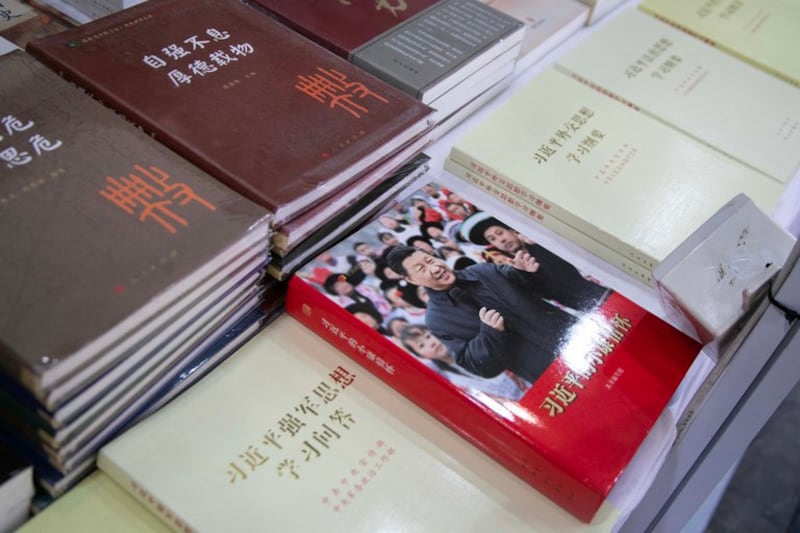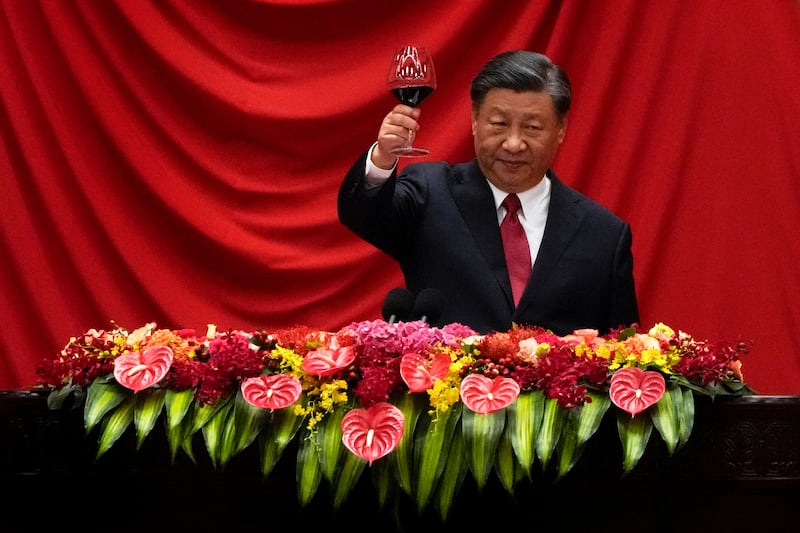Since Taiwanese voters elected Beijing's least favorite candidate Lai Ching-te as their next president, China is responding with growing pressure towards what it terms "peaceful unification," in a bid to bring the island under its control through propaganda, threats and infiltration rather than armed invasion, analysts told Radio Free Asia.
China launched its diplomatic offensive just two days after the elections, with Taiwan's former diplomatic ally Nauru announcing it had switched diplomatic ties to Beijing.
The ruling Chinese Communist Party followed that up with warnings from the Ministry of National Security, which vowed on its official WeChat account that "Our will is unwavering, and we are fully confident that we have sufficient capabilities to make good use of the sharp sword of the Anti-Secession Law to fight infiltration and sabotage activities planned by pro-independence separatist forces and external forces in Taiwan."
Beijing passed its anti-secession law against Taiwan in March 2005, in a move it said would legalize the use of force against the island, which split from the mainland in 1949 amid civil war and has never been ruled by the Chinese Communist Party.
But it has also used the law, along with its National Security Law, to threaten arrests and sanctions against anyone it deems to be working towards formal independence for the island, a sovereign state under the 1911 Republic of China whose government fled there after losing the civil war to Mao Zedong's communists in 1949.
Party leader Xi Jinping has repeatedly said that Taiwan must be "unified" with China, and refused to rule out the use of military force to annex the island.
‘Winning hearts and minds’
But a lengthy article calling for the redoubling of "United Front" influence operations in Hong Kong, Macau and Taiwan was recently published in the party's ideological journal Qiushi and on the front page of its official newspaper the People's Daily on Tuesday. This suggests Xi may be hoping that war won't be necessary, and that China can undermine Taiwan's democratic way of life through a gradual process similar to that used in Hong Kong.
Taking its text from Xi’s speech to a United Front conference last July, the article lists Hong Kong, Macau and Taiwan as key targets for the expansion of Chinese influence.
"[We must] do a good job of winning hearts and minds in Hong Kong, Macau, Taiwan and overseas, promoting patriotism in Hong Kong and Macau and patriotic forces in favor of unification in Taiwan," Xi wrote.

"We must also mobilize and develop patriotism among overseas Chinese, strengthening the unity of the Chinese people at home and abroad, as we build a model for the broader United Front operation," he said. "If everyone works together, we will be collectively stronger."
"We must ... develop and strengthen Taiwan's patriotic unification forces, oppose acts [promoting] 'Taiwan independence' and separatist acts, and promote the total unification of the motherland," Xi said, adding that "returned overseas Chinese and their family members should devote themselves ... to the cause of peaceful unification."
‘War without smoke’
Chau Chun-shan, a senior aide working on ties with Beijing during the administration of former Kuomintang President Ma Ying-jeou, said there hadn't been much "visible" military saber-rattling since Lai's victory was announced.
He pointed to the restarting of military talks between China and the United States following the Xi-Biden summit in November, where Xi reportedly denied there was a timetable for the invasion of Taiwan.
Instead, China looked more likely to weaponize its own laws against Taiwan, he said.
"The Anti-Secession Law is domestic Chinese legislation, so using it is tantamount to making the Taiwan question an internal matter," Chau said, adding that there are plenty of ways to step up pressure on Taipei without military exercises.
"That includes economic and trade [sanctions], cognitive warfare," he said. "These are all different kinds of warfare – it's just a war without smoke."
Chau expects the pressure to ramp up further when Lai assumes office on May 20, after winning an unprecedented third-term victory for the ruling Democratic Progressive Party, which has refused to go along with China's territorial claim on Taiwan – known as the "one China principle" – since President Tsai Ing-wen took office in 2020.
"China will definitely put pressure on them, because if it didn't, it would be hard to explain domestically, and harder to send a warning signal to the rest of the world, especially the United States," he said.
Hong Kong current affairs commentator Sang Pu said he fully expects Beijing to reproduce the influence tactics it used to subjugate Hong Kong, and use them in a broad-based attempt at infiltration in Taiwan, something the ruling DPP has vowed to resist.

"China has insufficient [military] strength, and invading Taiwan may not be a priority at the moment," Sang said. "They are probably thinking they need to prepare the ground with advanced brainwashing in Taiwan, or even ... infiltration and the instigation of rebellions."
"This is their most important task," he said, adding that United Front work takes various forms, including propaganda, cognitive warfare and "lawfare" using legislation.
He said the pro-democracy movement in Hong Kong had been successfully eliminated by a combination of those factors, particularly through the use of the 2020 National Security Law to prosecute anyone critical of the authorities.
May 20 inauguration
Chang Wu-yueh, director of the Cross-Strait Relations Research Center at Taiwan's Tamkang University, said the process will likely start building around the annual session of the National People's Congress in Beijing in early March.
By the time Lai takes office, early campaigning will be under way for U.S. presidential elections in November.
"This will be a warm-up for the election campaign, so pressure from Beijing will be concentrated in the period between March and May," he said.
But he said Lai's inauguration speech is unlikely to further antagonize China.
"Lai's May 20 inauguration speech isn't expected to anger Beijing, because it must be affirmed by the United States to some extent, so [Washington] must have no objections to it," he said.
A person working in national security in Taiwan said the government expects most of the pressure will be verbal and political, rather than military, in the post-election period, as China is unlikely to want to jeopardize its slowly thawing ties in the form of resumed military talks with Washington.
"Also, Xi Jinping doesn't seem to be done with his anti-corruption purge of the military yet, and there are various very different voices within the [military] leadership," the person said. "All of that restricts Xi Jinping from carrying out very large-scale or intensive operations."
But there is likely to be a resurgence in military activity by the People's Liberation Army after May, backing up China's economic sanctions and information warfare targeting Taiwan, the person said.
Chau agreed. "They will go both soft and hard," he said. "The military operations won't stop -- crossing the median line of the Taiwan Strait has become normalized, and will become more and more frequent in future."
"[Beijing] is now focused on the Nov. 5 elections in the United States, not on the Jan. 13 elections in Taiwan," he said.
Translated by Luisetta Mudie. Edited by Malcolm Foster.
